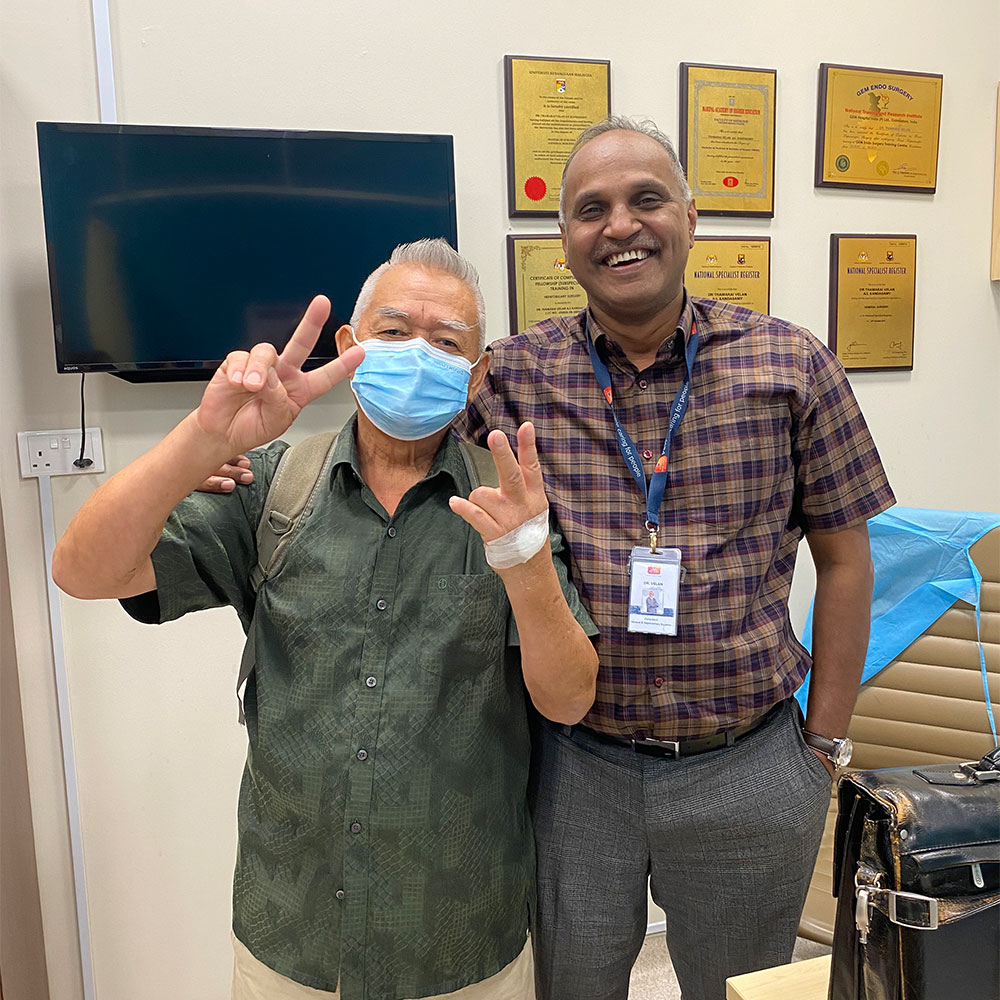TELL US BRIEFLY ABOUT YOURSELF AND WHAT YOU DO IN THE MEDICAL FIELD.
After graduating from medical college, I obtained a master’s degree in General Surgery, followed by a fellowship in Hepatopancreatobiliary (HPB). I worked as a consultant HPB surgeon in several public hospitals before joining the private sector.
My HPB sub-specialty is focused on treating diseases or conditions related to the liver, gallbladder and pancreas. General surgical conditions like appendicitis, colorectal cancers/diseases, hernias, haemorrhoidal diseases, thyroid and breast diseases also come under my general surgical domain. Even though I am sub-specialised in HPB, I also treat general surgical cases.
WALK US THROUGH A DAY IN YOUR TYPICAL SCHEDULE AT THE HOSPITAL.
I usually start my day at 8am, when I will first review in-patients through my desktop at the clinic, taking notes of their latest investigation results (blood test and imaging) and noting their progress in the wards. Thereafter, I start my morning rounds—assessing the patients clinically and deciding on the next course of action. If they need surgery or endoscopy, it has to be scheduled or referred to other specialties if needed.
After completing ward rounds, I usually go to the doctor’s lounge for a short coffee break before starting my morning clinics. In the morning, I would often see roughly about five to eight patients, including those with appointments and walk-ins. If I have surgeries or endoscopic procedures scheduled for the day, it would be mostly done in the morning or just after my morning session.
Later in the evening, I resume my afternoon clinic from about 2pmuntil 5pm. Thereafter, my evening ward round follows, whereby I take note of patients’ progress for the day, report on any new emerging issues and arrange for appropriate plans to be carried out. Elective surgeries or endoscopic procedures will also be scheduled for the next day. Every four weeks, I will also have on-call duty to cover for any surgical emergencies that are presented or brought to the hospital.

WHAT DO YOU FIND MOST CHALLENGING ABOUT YOUR ROLE?
What challenges me the most as a surgeon is arriving at an accurate surgical diagnosis, after a thorough clinical history from patients, examination, reviewing biochemical and imaging results and executing the most appropriate treatment plan to the patient so that I can give the best treatment and help them to lead a quality life.
THERE IS THIS NOTION THAT DOCTORS BECOME DESENSITISEDTO DEATH AND DISEASES WITH MORE EXPERIENCE ANDEXPOSURE. IS THIS TRUE AND HOW DO YOU DEAL WITH IT?
In my perspective, this is a very subjective question of one’s own experience. I have worked in the healthcare system for 26 years and learned to accept death as an inevitable part of life. However, being at the forefront of saving people’s lives, I do my level be stand give the best possible professional help medically in terms of providing treatment, care and improving patient’s quality of life.
At the end of the day, doctors are humans too, so we have to learn how to cope with a patient’s death. Rather than feeling desensitised to death and suffering, I would prefer to say that I have learned ways to overcome it with much less emotion attached to it.
HOW DO YOU COPE WITH THE CHALLENGES AND PARTS AND PARCELS OF YOUR JOB?
In challenging and complex cases, I have the propensity to discuss them with my colleagues and get their input to arrive at a treatment option. Ultimately, what is most important is teamwork when facing complex surgical cases. This is to enhance the delivery of a safe and accurate treatment plan and avoid any adverse events that could potentially be harmful to the patient.
WHAT DO YOU WISH YOU KNEW BEFORE JOINING MEDICAL SCHOOL OR CHOOSING YOUR SPECIALITY?
The work-related challenges that I/we often face at times can be mentally and physically exhausting in nature. Also, the increasing medico-legal implications, as well as unreasonable expectations from patients and families when dealing with medical/ surgical conditions beyond the doctors control despite the best optimal treatment provided.
BASED ON YOUR EXPERTISE, DO YOU HAVE ANY ADVICE FOR THE PUBLIC ON HOW TO TAKE BETTER CARE OF THEIR HEALTH?
It is important to develop a habit of practising a healthy lifestyle and enjoying everything that life has to offer in moderation. This includes eating a balanced diet, maintaining a healthy weight, exercising daily or at least three times a week, and getting good sleep. Living life in moderation gives better and greater satisfaction, as anything in excess is often detrimental to our health.
Source: Buro 247



